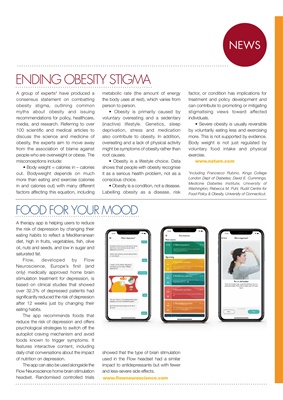
NEWS
FOOD FOR YOUR MOOD
ENDING OBESITY STIGMA
A group of experts have produced a
consensus statement on combatting
obesity stigma, outlining common
myths about obesity and issuing
recommendations for policy, healthcare,
media, and research.
Referring to over 100 scientific and
medical articles to discuss the science
and medicine of obesity, the experts aim
to move away from the association of
blame against people who are overweight
or obese. The misconceptions include:
• Body weight = calories in - calories
out. Bodyweight depends on much
more than eating and exercise (calories
in and calories out) with many different
factors affecting this equation, including
metabolic rate (the amount of energy
the body uses at rest), which varies from
person to person.
• Obesity is primarily caused by
voluntary overeating and a sedentary
(inactive) lifestyle. Genetics, sleep
deprivation, stress and medication
also contribute to obesity. In addition,
overeating and a lack of physical activity
might be symptoms of obesity rather than
root causes.
• Obesity is a lifestyle choice. Data
shows that people with obesity recognise
it as a serious health problem, not as a
conscious choice.
A therapy app is helping users to reduce
the risk of depression by changing their
eating habits to reflect a Mediterranean
diet, high in fruits, vegetables, fish, olive
oil, nuts and seeds, and low in sugar and
saturated fat.
Flow, developed by Flow
Neuroscience, Europe's first (and
only) medically approved home brain
stimulation treatment for depression, is
based on clinical studies that showed
over 32.3% of depressed patients had
significantly reduced the risk of depression
after 12 weeks just by changing their
eating habits.
The app recommends foods that
reduce the risk of depression and offers
psychological strategies to switch off the
autopilot craving mechanism and avoid
foods known to trigger symptoms. It
features interactive content, including daily
chat conversations about the impact of
nutrition on depression, and psychological
strategies to help users switch off their
autopilot craving mechanism and avoid
foods known to trigger symptoms.
The app can also be used alongside
the Flow Neuroscience home brain
stimulation headset. Randomised
controlled trials showed that the type of
brain stimulation used in the Flow headset
• Obesity is a condition, not a disease.
Labelling obesity as a disease, risk
factor, or condition has implications for
treatment and policy development and
can contribute to promoting or mitigating
stigmatising views toward affected
individuals.
• Severe obesity is usually reversible
by voluntarily eating less and exercising
more. This is not supported by evidence.
Body weight is not just regulated by
voluntary food intake and physical
exercise.
www.nature.com
had a similar impact to antidepressants
but with fewer and less-severe side
effects.
www.flowneuroscience.com